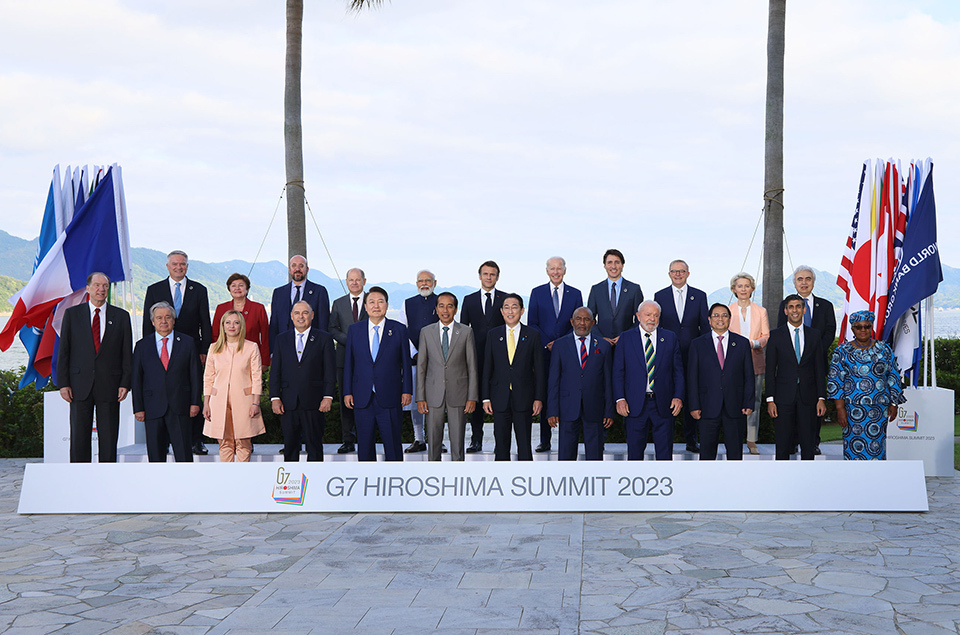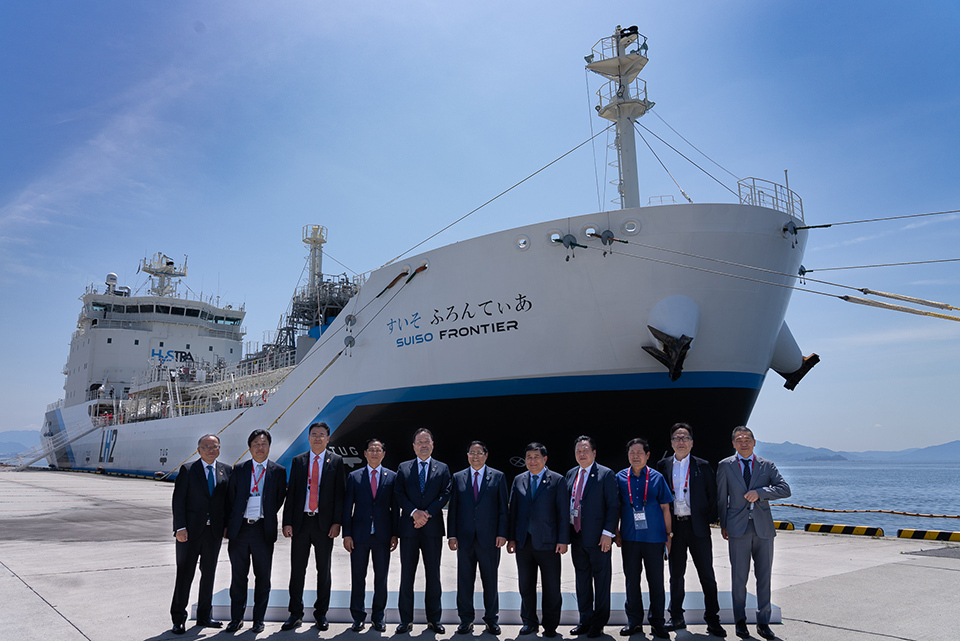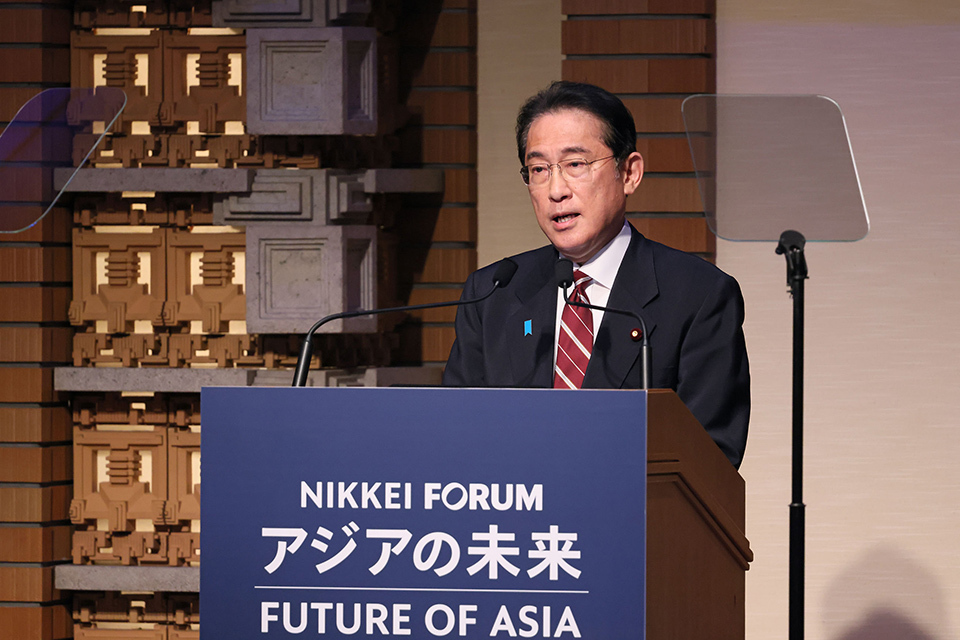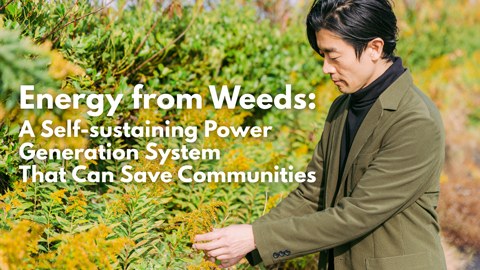MAY 25, 2023
Prime Minister Kishida delivering a speech at the Nikkei Forum 28th Future of Asia dinner. He emphasized Japan’s unique approach that promotes cooperation while accepting diverse values and cultures.
On May 25, 2023, Prime Minister Kishida delivered a speech at the Nikkei Forum 28th Future of Asia dinner held in Tokyo, reviewing the outcomes of the G7 Hiroshima Summit, which concluded four days earlier, and declaring that Japan will work hand in hand with Asia to co-create the future together based on equal partnerships.
1. Introduction: Outcome of the G7 Hiroshima Summit
I chaired the G7 Summit in Hiroshima, and it was successfully concluded last Sunday.
I feel that this summit was a historic one, as we squarely addressed various difficult challenges the world is facing at a turning point in history.
If I dare tell you the historical significance of the G7 Hiroshima Summit, it can be summarized in the following three points.
The first is to uphold and reinforce the free and open international order based on the rule of law. We reaffirmed the importance of the universal principles which are the foundation of the international community, and sent out a strong message to the world as the “will of the G7.” We were also able to further strengthen the unity and coordination of the G7 with regard for our efforts of “support for Ukraine and sanctions against Russia,” “free and open Indo-Pacific,” and “economic security.”
Second, the G7 strengthened their outreach to international partners including countries referred to as the Global South. We invited leaders from eight countries including Indonesia, Viet Nam, India and the Republic of Korea and the heads of seven international organizations, and successfully strengthened coordination and cooperation with the G7 on global challenges such as food, energy and climate change. This was also one of the important achievements.
Then, we invited Ukraine’s President Volodymyr Zelenskyy and held an outreach session with the leaders of the invited countries. As the chairperson, I put together our shared view on the following four points:
(i) First, all countries should adhere to the principles of the United Nations (UN) Charter, including respect for sovereignty and territorial integrity;
(ii) Second, confrontation should be resolved peacefully through dialogue, and we support a just and lasting peace that is based on respect for international law and the principles of the UN Charter;
(iii) Third, any unilateral attempt to change the status quo by force is unacceptable anywhere in the world;
(iv) Last, we strive to uphold the free and open international order based on the rule of law.
Third, in Hiroshima, a place symbolizing peace, we were able to send a strong message that nuclear threat, let alone the use of nuclear weapons is unacceptable.
We successfully compiled the “G7 Leaders’ Hiroshima Vision on Nuclear Disarmament,” the first ever G7 stand-alone document of its kind. We will continue and strengthen our realistic and pragmatic efforts through the implementation of the “Hiroshima Action Plan.” We were also able to fulfill our major objective in holding the G7 Summit in Hiroshima which is to have the leaders of the world deepen their understandings of the reality of the nuclear weapons use and send a strong message to the world.
I believe that all the participating leaders and heads of international organizations who visited the Peace Memorial Park fully received the message that the city of Hiroshima embodies.
We will connect the outcomes of the Hiroshima Summit to meetings such as the ASEAN-related Summit to be held in Indonesia and the G20 Summit to be held in India.
And in December this year, we will hold a commemorative summit in Tokyo to mark the 50th Year of the ASEAN-Japan relations. With the enthusiasm of the success of Hiroshima Summit intact, we hope to move forward together, hand in hand, toward a better future for our Asia.
2. Promoting a “Free and Open Indo-Pacific (FOIP)”
FOIP is a guiding concept to lead the international community toward “cooperation” because it could head toward division and confrontation if left unchecked.
It is important that we all share and practice the idea of not unilaterally imposing values and not excluding certain countries. For the sake of a free, fair, and equitable economic order that does not create division, we cannot accept that a country is intimidated by other countries or is forced to fall into the so-called “debt trap” through opaque and unfair development finance.
Japan will defend a free and open international order based on the rule of law for the inclusive and sustainable growth of Asia.
In March this year, I announced a “New Plan for a FOIP.” The “Indo-Pacific Way” approach, which I mentioned at that time, is an important concept for advancing FOIP cooperation.
The Indo-Pacific approach is to accept diverse values, cultures, and histories; to respect and be close to others; to promote cooperation through dialogues; and to deal with various challenges in a realistic and practical manner.
Japan’s ASEAN diplomacy has been built on “heart to heart” relationships and cooperation as “equal partners.” This is the very practice of the “Indo-Pacific approach.”
The effectiveness and significance of this approach has been proven when looking at today’s ASEAN-Japan relations, which are firmly bound by mutual “trust” and “respect.”
It is because of this conviction that, since assuming office as Prime Minister, I have held close discussions with leaders of various countries around the world, particularly in Asia, to listen to their various views and to foster mutual trust.
I believe that the results of such visits could be fully utilized in the discussions at this G7 Summit. We were able to confirm that the G7 will take actions united on many issues facing the Global South.
Through this Indo-Pacific approach, Japan will contribute to peace, stability, and prosperity in Asia in its own way.

A commemorative photo of leaders of the G7 and the invited countries as well as heads of international organizations at the G7 Hiroshima Summit. As the Summit was held in Japan—the only G7 member in Asia—for the first time in seven years, the Indo-Pacific was discussed thoroughly.
3. Shaping Asia’s future together through “co-creation”
Next, I would like to address what specific actions we should take to shape “the future of Asia.”
I believe that the keywords are the realization of “multi-layered connectivity” based on equal partnerships, the “co-creation” of Asia’s future together, with Japan and Asia, the government and the private sector, working hand in hand through these “ties.”
Japan has built inseparable relations with Asian countries through “ties” and people-to-people exchanges in a wide range of fields. These relations continue to expand and deepen.
A think-tank recently conducted a survey and found that “Japan is the most trusted country in the political and business circles of ASEAN countries.” The “trust” we have built throughout our history is the foundation of the ASEAN-Japan relation.
Building on this foundation, we will further deepen ties and “people-to-people exchanges” in a wide range of fields, including economy, sports, culture, and the arts, that support a strong relationship between Japan and Asia.
I will also focus on creating “new” ties for the future.
Fast-growing Asia is becoming one of the world’s largest consumer markets. At the same time, it faces many social challenges, such as disparity between the rich and the poor, traffic congestion, and vulnerability of financial, information and energy infrastructures.
The attractiveness as a consumer market and the strong enthusiasm for solving social issues are transforming this region into a major innovation hub.
I am confident that Japan and Asia can build a new relationship in this area of “innovation.”
For example, a digital currency that can be used without fees or a bank account. It was a Japanese startup that established the system called “Bakong” used in Cambodia.
This Bakong is also used for cross-border transactions with neighboring countries like Thailand and Malaysia, making people’s lives more convenient and affluent, and opening up new horizons for innovation.
Recently, Japan took the lead in organizing a pitch event in Singapore to connect large Singaporean and Japanese companies with startups in Asia. It was very well received.
I believe that we can create a “second and third Bakong” by creating a chain of innovation that transcends national borders.
I believe that the fresh ideas and pioneering spirit that only a startup can bring to the table will be the driving force to usher in a new era in a variety of fields, including energy, climate change, disasters, and health care.
The stage spans a vast area, from South Asia and ASEAN to the islands of the Pacific. The Indo-Pacific is truly the “new frontier” of innovation.
Japan will strongly support startups that try this new frontier, in cooperation with the United States, Australia, NZ, and other countries that share the FOIP concept.
I will also further promote the “Asia DX” initiative, in which ASEAN companies and Japanese companies cooperate to co-create innovations to solve social issues in Asia.
Recently, there have been increasing opportunities for Japan to bring back the outcomes achieved in Asia, and for Japan to solve social issues with the support of ASEAN.
Asia faces a variety of social challenges. I feel that the region has unlimited potential if these challenges can be converted into an engine for growth.
Transforming social issues into the engine of growth is the very concept of the “new capitalism” I am putting forward. Under this concept, I will “co-create” the future of Asia by enhancing “multi-layered connectivity” while placing importance on a “people-focused” approach.
Through such initiatives in a wide range of fields toward the “co-creation of Asia’s future,” I would like to elevate our cooperation with Asian countries, and together with you all, strengthen the foundation for further prosperity of a free and open Indo-Pacific region.
4. Importance of rule-making to support “co-creation”
IPEF is a new economic framework that was launched a year ago. As a member of Asia, Japan hopes to act as a bridge between Asia and the United States, and to achieve a meaningful outcome.
In the digital area, Japan will establish a Digital Innovation Center at Economic Research Institute for ASEAN and East Asia, ERIA and work on the advancement of reliable data linkage and supply chain in the Asian region, in order to operationalize the “DFFT” proposed by Japan and confirmed at the recent G7 Hiroshima Summit.
One of the initiatives Japan is working on in the “Green Sector” is the Asia Zero Emission Community initiative. At the Hiroshima Summit, we shared the concept of “One Goal, Various Pathways,” which aims to holistically address energy security, climate crisis and geopolitical risks, and to achieve our common goal of net-zero emissions through various pathways taking into account national circumstances.
Japan will build on its accumulated decarbonization technologies and experiences in hydrogen and ammonia, and promote concrete projects to implement this initiative and support the energy transitions of partner countries in the region.
At the Hiroshima Summit, “Economic Security” was discussed for the first time in an independent session. We compiled a statement in this area and agreed on the principles on resilient and reliable supply chains. Honoring international law, being free and fair, fostering mutually beneficial economic and trade relations, and standing firmly against weaponizing economic dependencies are the principles based on which Japan will spread to the world and Japan will work with its international partner economies to strengthen global economic resilience. Japan will play a central role in this effort.
We also confirmed that the G7 will unite to work on “infrastructure development” in the Global South countries. While attracting private-sector funding, we will work to develop smart industrial complex, transportation networks such as rail and road that enhance region’s connectivity, as well as infrastructure for the energy transitions.

On the occasion of the G7 Hiroshima Summit, Prime Minister Chinh (sixth from the right) of Viet Nam visited and observed the world’s first hydrogen transport ship, which was manufactured by Japan. Japan will accelerate its investment toward realizing large-scale hydrogen supply chains across the Asia-Pacific region. KAWASAKI HEAVY INDUSTRIES
5. Deeper cooperation with partners
These efforts can only flourish on the basis of strong country-to-country relations.
I would like to specifically address our cooperation with Southeast Asia, South Asia, Pacific Island countries —which we have identified as “key areas for cooperation” in the new FOIP Plan—and the Republic of Korea, an important neighbor of Japan.
First, deepening cooperation with Southeast Asia. This year marks the 50th anniversary of ASEAN-Japan relations. Over the past half a century, Japan has consistently supported the “centrality” and “unity” of ASEAN. Japan has also strengthened cooperation in promoting the AOIP, which shares many fundamental principles with the FOIP.
Japan will also continue to support attractive cultural and people-to-people exchanges such as “WA Project” and JENESYS. Japan will also invite young entrepreneurs and others from ASEAN to Japan for the “ASEAN-Japan Young Business Leaders Summit” to create new “ties” for the next generation.
On the occasion of the ASEAN-Japan Commemorative Summit in December this year, we will set forth a new vision for cooperation that envisions the “next 50 years” of ASEAN and Japan and take ASEAN-Japan relations to the next stage.
Second is to strengthen cooperation with South Asia. The Bay of Bengal and Northeast India Industrial Value Chain Initiative set forth as part of Japan’s new plan for a FOIP, aims not only to support hard and soft connectivity but also to promote private investment, and to foster business and industrial development throughout the region by working with Bangladesh and India. Japan will promote a variety of concrete projects that will also benefit Japanese industry.
Sri Lanka, which celebrated the 70th anniversary of its diplomatic relations with Japan last year, is also a hub in the Indian Ocean. Japan has been leading the discussions among the creditor countries in addressing Sri Lanka’s debt issues. We will continue to contribute to debt restructuring efforts and help Sri Lanka get back on track for growth as soon as possible.
Third, I would like to further deepen our cooperation with Pacific Island countries.
I have had a series of meetings with Prime Minister Brown of the Cook Islands, as well as leaders from Palau, Fiji, Tuvalu, and other countries. I am also placing the utmost importance on working together with Pacific Island counties to overcome their risks and vulnerabilities such as sea level rise due to climate change, and hurricanes.
It is of our interest to see the stable development of this region. Japan will further strengthen efforts in preparation for the Pacific Islands Leaders Meeting to be hosted by Japan next year.
Last but not least, I want to address cooperation with the Republic of Korea. I have resumed “shuttle diplomacy” with President Yoon for the first time in 12 years, and we have had three summits in the past two months, including the G7 Hiroshima Summit. I would like to continue to promote concrete cooperation through close communication between our two countries.
6. Conclusion
Japan will continue to respect the diversity of Asia, and as a good partner, we will work together with you all to shape the future of this region.
Thank you very much.
* The above text was republished from the website of the Prime Minister’s Office of Japan: https://japan.kantei.go.jp/101_kishida/statement/202305/25speech.html






























